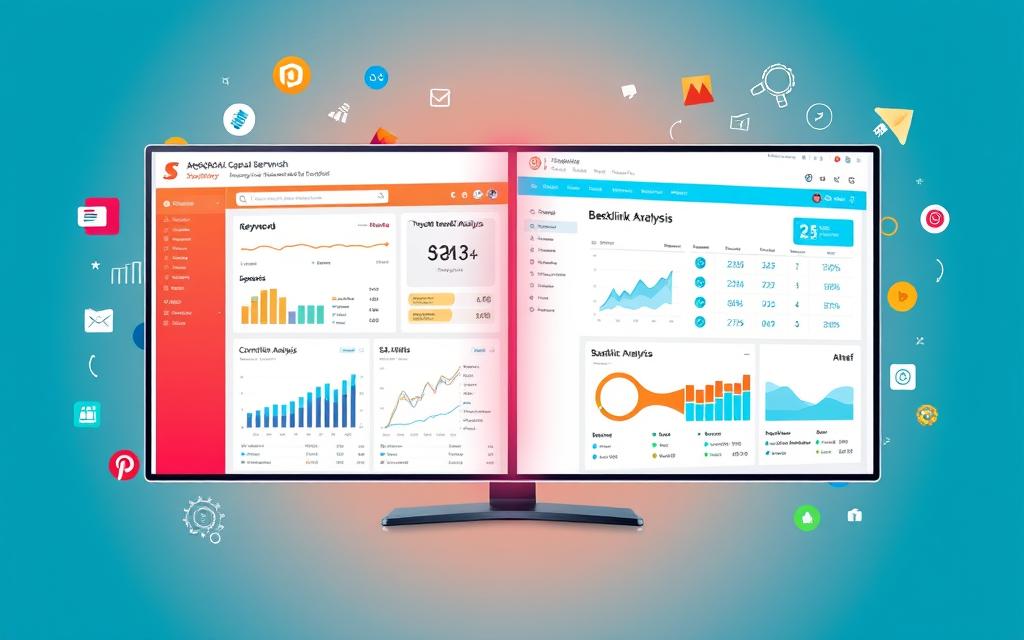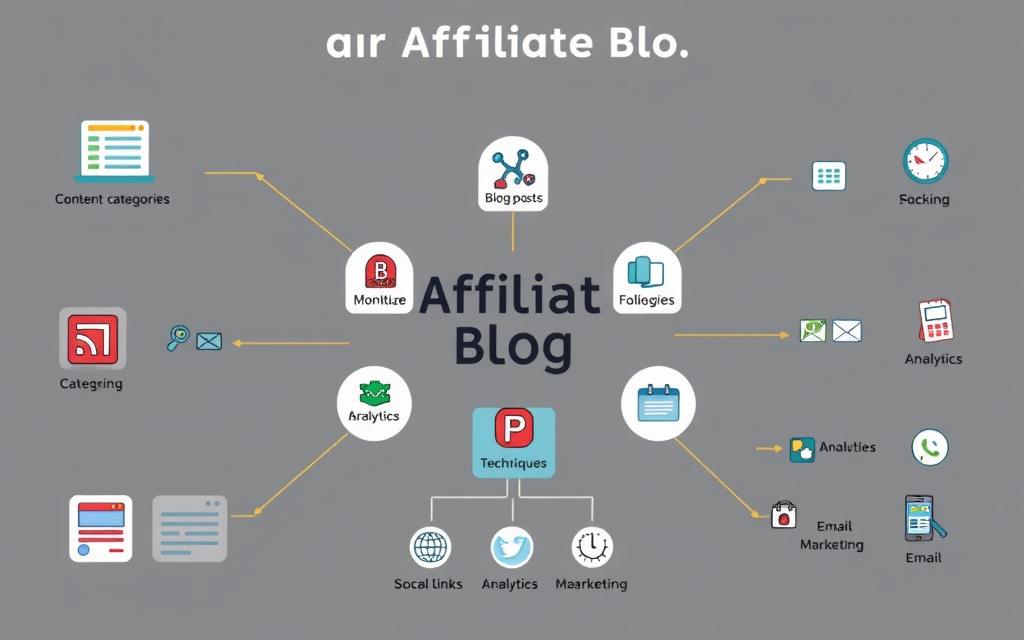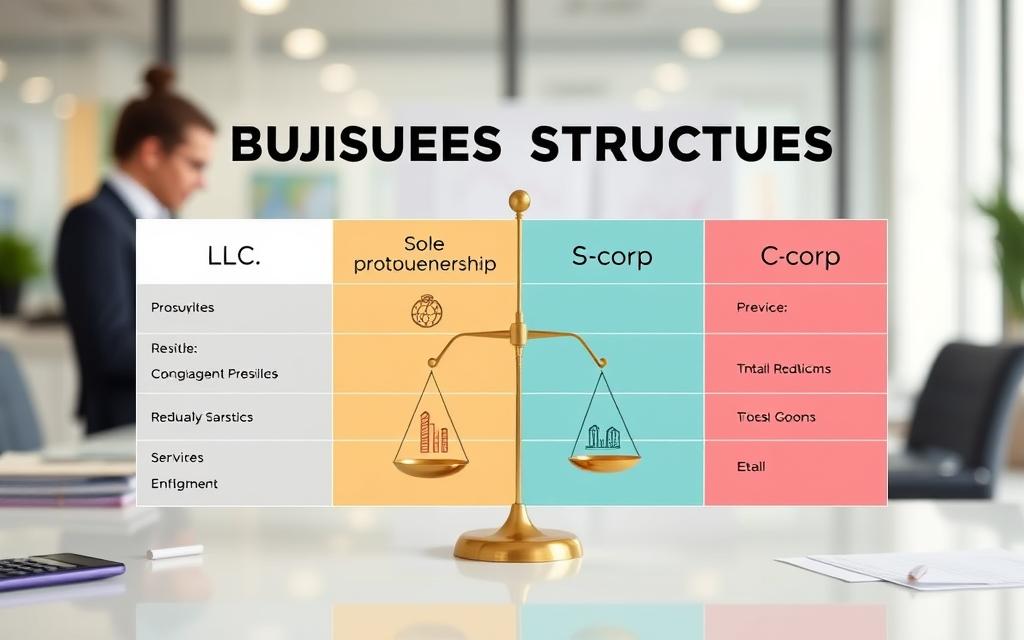Are you an affiliate blogger looking to grow your business? Registering as a limited liability company (LLC) might be the smart choice. But, where do you start with the LLC registration process? This guide will show you how to turn your affiliate blogging business into an LLC. You’ll learn to handle legal matters with ease.
Key Takeaways
- Understand the benefits of forming an LLC for your affiliate blogging business
- Learn the crucial steps to register your LLC, from choosing a name to filing the necessary paperwork
- Explore the tax implications and deductions available for affiliate bloggers operating as an LLC
- Discover strategies for maintaining compliance and growing your LLC-structured affiliate marketing venture
- Access valuable resources and expert guidance to navigate the LLC registration process with ease
Understanding the Basics of an LLC
Starting a successful affiliate marketing business means choosing the right business structure. The Limited Liability Company (LLC) is a top choice for many. Knowing what an LLC is helps decide if it’s right for your online business.
What is an LLC?
An LLC is a mix of a sole proprietorship or partnership and a corporation’s liability protection. It’s great for small businesses and independent contractors, like affiliate bloggers. It offers tax benefits and legal protection.
Benefits of Forming an LLC
One big plus of forming an LLC is the liability protection it gives. Your personal stuff, like your home and savings, is safe from your business’s debts or legal issues. This keeps your personal and business finances separate, giving you peace of mind and financial safety.
LLCs also let you choose how you’re taxed. You can be taxed as a sole proprietor, partnership, or corporation. This flexibility helps you manage your taxes better.
Differences Between LLC and Other Business Structures
| Business Structure | Liability Protection | Taxation | Ownership |
|---|---|---|---|
| Sole Proprietorship | No liability protection | Taxed as personal income | Single owner |
| Partnership | No liability protection | Taxed as personal income | Multiple owners |
| Corporation | Liability protection | Taxed as a separate entity | Shareholders |
| LLC | Liability protection | Flexible taxation options | Single or multiple members |
Knowing what an LLC offers helps affiliate bloggers choose wisely. It’s about finding the right LLC liability protection and benefits for their business.
Assessing Your Need for an LLC
As an affiliate blogger, deciding to form an LLC is a big deal. It can change how your business works. Knowing the good and bad can help you decide if an LLC is right for you.
Why Affiliate Bloggers Should Consider an LLC
LLCs are great for affiliate bloggers. They protect your personal stuff, like your house or savings, from business debts. This is key because blogging as an LLC keeps your personal and business money separate. It lowers the chance of losing your personal money.
Also, LLCs might save you money on taxes for affiliate marketing LLC work. You could get tax benefits because your LLC’s profits and losses are on your tax return. This could mean you pay less in taxes.
Potential Risks of Not Forming an LLC
- Your personal stuff could be at risk if your blog business gets into trouble.
- You might pay more in taxes without an LLC.
- Not having an LLC could make you seem less professional. This could hurt your chances with sponsors, partners, or clients.
Choosing to form an LLC for your blogging as an LLC or affiliate marketing LLC is a big choice. It depends on your business needs, money situation, and future plans. Talking to a lawyer or tax expert can help you make a smart choice that’s good for you.
Steps to Prepare for LLC Registration
Starting an LLC as an affiliate blogger might seem hard, but it’s easier than you think. With the right steps, you can make it a smooth and rewarding journey. Let’s look at the main steps to get ready for LLC registration.
Choosing Your LLC Name
Picking a unique and memorable name for your business is the first step. Your LLC name should stand out and show what your affiliate marketing is about. Make sure to check your state’s rules and that the name you pick is available and follows the regulations.
Researching Your State’s LLC Requirements
Every state has its own rules for starting an LLC. It’s key to know these rules well. This includes the paperwork you need, filing fees, and other details specific to your state. Knowing this will help your LLC registration go smoothly.
Drafting an Operating Agreement
An LLC operating agreement is a vital document. It outlines how your business is run, who owns it, and how decisions are made. For affiliate bloggers, it’s important to customize this agreement. It should cover profit sharing, decision-making, and who does what.
| Key Elements of an LLC Operating Agreement | Importance for Affiliate Bloggers |
|---|---|
| Ownership and Membership Interests | Clearly defines the ownership structure, which is particularly relevant if you have multiple affiliate partners involved. |
| Management and Decision-Making | Establishes the decision-making process, ensuring smooth operations and alignment among affiliate partners. |
| Profit and Loss Allocation | Determines how profits and losses from affiliate marketing activities will be distributed among members. |
| Dissolution and Termination | Outlines the process for winding down the LLC, which may be necessary if an affiliate partnership ends. |
By focusing on these important points, you can make an LLC operating agreement that supports your affiliate blogging business well.

Filing Your LLC Registration
Setting up an LLC for your affiliate blogging business is a key step. You need to know where to file, what documents are needed, and the costs involved. This ensures a smooth registration process.
Where to File Your LLC Papers
To start, figure out where to file your LLC. You’ll usually need to register with your state’s Secretary of State or similar agency. Many states let you register online, making it easier.
What Documents Are Required?
- Articles of Organization: This document officially starts your LLC.
- Operating Agreement: It outlines how your LLC will be run and who does what.
- Employer Identification Number (EIN): You’ll get this from the IRS for taxes.
How Much Does It Cost?
The cost to form an LLC varies by state. Fees range from $50 to $500. Some states charge extra for things like reserving a business name. Always check your state’s fees to plan your budget.
| State | LLC Filing Fee |
|---|---|
| California | $70 |
| New York | $200 |
| Texas | $300 |
| Florida | $125 |
Every state has its own rules for registering an LLC. So, it’s crucial to research your state’s specific needs. With the right information, you can set up your LLC and start your affiliate blogging journey.
Operating Your LLC
Starting your blogging as an LLC is just the start. After your LLC is set up, you must follow key steps. These steps help your business run smoothly and follow the law.
Essential Steps After Registration
After your LLC is registered, get an Employer Identification Number (EIN) from the IRS. This tax ID is key for opening a business bank account, filing taxes, and more.
Setting Up a Business Bank Account
Getting a business bank account is vital for starting an LLC as an affiliate blogger. It keeps your personal and business money separate. This makes it easier to track your spending, manage money, and get ready for taxes.
Separation of Personal and Business Finances
- Don’t mix your personal and business money. This could risk the protection your LLC offers.
- Use the business bank account for all money and costs from your affiliate blogging.
- Keep good records of all money dealings. This makes accounting and tax time easier.
By following these important steps, you’re on the right path. You’ll run your blogging as an LLC professionally and legally. This sets you up for success in the long run.
Tax Considerations for Your LLC
As an affiliate blogger with an LLC, knowing about taxes is crucial. You can make your business more efficient and save on taxes by understanding LLC taxes. This helps you keep more of your earnings.
Understanding LLC Taxation
LLCs are seen as “pass-through” entities. This means profits and losses go to the members’ personal tax returns. It helps avoid the double taxation of traditional corporations. Knowing the different LLC tax structures is key to picking the best one for your affiliate marketing business.
Deductions Available for Affiliate Bloggers
- Business expenses: You can deduct many costs related to affiliate marketing, like web hosting and marketing tools.
- Home office deduction: If you use part of your home for business, you might get a deduction for those expenses.
- Travel and entertainment: Some travel and entertainment costs, like going to industry events, can be deducted.
Keeping Accurate Financial Records
Keeping detailed financial records is vital for your LLC’s tax compliance and health. You need to track all income, expenses, and assets. Properly categorizing and documenting each transaction helps. This makes tax preparation easier and ensures you get all the deductions you can.
| LLC Tax Implication | Affiliate Marketing LLC Considerations |
|---|---|
| Pass-through taxation | Profits and losses are reported on personal tax returns |
| Deductible expenses | Business, home office, travel, and entertainment expenses |
| Financial record-keeping | Tracking income, expenses, and assets for accurate tax filing |
Understanding your LLC’s tax implications and using available deductions can improve your business’s financial health. Keeping accurate financial records is essential for a smooth tax filing process.

Choosing a Registered Agent
When you start the LLC registration process for new affiliate bloggers, picking the right registered agent is key. A registered agent is crucial for keeping your LLC in good standing with state laws. They handle official documents and act as your business’s official contact with the state.
What is a Registered Agent?
A registered agent is someone or a company that gets official documents for your LLC. This includes tax forms, legal notices, and service of process. They are the main point of contact between your business and state authorities.
How to Select the Right Registered Agent
- Look for a reliable and quick registered agent to get important documents on time.
- Make sure the registered agent is available during business hours to accept legal documents.
- Check if the registered agent knows the online business registration rules in your state.
- Decide if you want to use an individual, like yourself or an employee, or a professional service.
- Compare the registered agent’s fees to see if they fit your budget and business needs.
Choosing the right registered agent can give you peace of mind. It helps you stay compliant as your affiliate blogging business grows. Take time to research and compare options to find a reliable partner for this important role.
| Registered Agent Criteria | Considerations |
|---|---|
| Availability | Must be available during regular business hours to accept service of process |
| Expertise | Should have in-depth knowledge of state-specific LLC registration process for new affiliate bloggers and compliance requirements |
| Responsiveness | Prompt in forwarding important documents and communicating with the LLC owner |
| Fees | Registered agent fees should fit within the online business registration budget |
Maintaining Compliance as an LLC
As an affiliate blogger with an LLC, keeping up with compliance is key. This helps avoid legal issues and protects your business. Here, we’ll cover the important steps to keep your LLC compliant and in good standing.
Importance of Annual Reports
Annual reports are a big deal for LLCs. You file them with your state’s business registry. They update your company’s activities and finances. Keeping up with these reports shows you’re transparent and responsible.
Understanding Licenses and Permits
Your affiliate blogging business might need different licenses and permits. This could include business licenses, sales tax permits, or industry-specific certifications. Make sure you know the local rules and get the right licenses to operate.
How to Stay Informed on Compliance Changes
- Subscribe to industry newsletters and regulatory updates. This helps you know about changes in laws or requirements that might affect your LLC liability protection or blogging as an LLC.
- Check your state’s business registry website often. Look for updates on compliance deadlines and new rules.
- Think about using a professional registered agent service. They can help you deal with changing compliance rules.
Being proactive and alert about your LLC’s compliance is crucial. It keeps your blogging as an LLC venture safe and protects your LLC liability protection. Compliance is an ongoing task, but it’s worth it for the benefits.
| Compliance Requirement | Frequency | Potential Consequence for Non-Compliance |
|---|---|---|
| Annual Report | Annually | Fines, loss of good standing, potential dissolution of the LLC |
| Business Licenses and Permits | Varies by location and industry | Fines, legal penalties, inability to operate the business |
| Registered Agent Maintenance | Ongoing | Inability to receive important legal documents, potential penalties |
Marketing Your LLC as an Affiliate Blogger
As an affiliate blogger with an LLC, it’s key to have a strong online presence. Use different marketing strategies to grow your business. This way, you can attract more partners, collaborators, and customers. It helps drive success in your affiliate marketing.
Building an Online Presence
Start with a professional, easy-to-use website. It should show your expertise, services, and affiliate offerings clearly. Update your blog often with valuable, SEO-optimized content. This boosts your visibility and credibility in the affiliate marketing LLC world.
Networking with Other Bloggers
Connecting with other online business registration fans and affiliate marketers is great. Go to industry events, join online communities, and work on cross-promotional projects. These connections can lead to partnerships, guest posts, and referrals.
Leveraging Social Media for Growth
- Use platforms like Twitter, LinkedIn, and Instagram to share your knowledge, engage with your audience, and show what your LLC offers.
- Work with social media influencers in your field to reach more people and build trust.
- Run targeted ads on social media to find potential clients and partners interested in your affiliate marketing LLC services.
By using these marketing strategies, you can promote your LLC well. You’ll become a trusted and valuable resource in the online business registration world. This attracts more clients, expands your affiliate network, and grows your LLC-based affiliate marketing business.
Resources for Affiliate Bloggers
Starting an LLC as an affiliate blogger can seem tough. But, there are many online tools, communities, and services to help. They make the LLC registration process easier for new affiliate bloggers.
Online Tools for LLC Registration
Many platforms offer easy LLC registration services. They guide you through each step. You can check if your business name is available, get help with filing documents, and get ongoing support. LegalZoom, Incfile, and ZenBusiness are some top choices.
Communities and Forums for Support
Talking to other affiliate bloggers who have started an LLC is very helpful. Sites like Blogging Boost, Affiliate Summit, and Affiliate Marketing Mastery have forums. There, you can ask questions, share tips, and learn from others.
Professional Services to Consider
- Accountants: A good accountant can help you set up your LLC right and find the best tax strategies.
- Attorneys: While not always needed, a business law attorney can help with the legal parts of starting an LLC.
- Registered Agent Services: Using a professional service for your registered agent needs can make compliance easier and save you time.
Using these resources can make the LLC registration process smoother for affiliate bloggers. Whether you’re just starting or want to improve your LLC, these tools and services are very helpful.
Conclusion: Your Next Steps in LLC Registration
Forming an LLC can offer big benefits for affiliate bloggers. It gives you liability protection, tax perks, and a professional look. With the right help and prep, setting up your LLC can be easy and rewarding for your online business.
Final Thoughts on Starting Your LLC
For a successful LLC, know your state’s rules well. Make a detailed LLC operating agreement. Also, keep up with annual filings and manage your finances right. These steps will help you build a solid base for your affiliate blogging business.
Resources for Ongoing Education
To keep your LLC growing, stay up-to-date with laws and best practices. Look for reliable online sources, go to industry events, and talk to legal and accounting pros. Learning more will help you handle the challenges of running an LLC-structured affiliate blogging business.












Leave a Reply